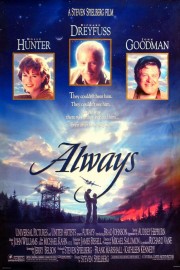Always
After having watched “Always,” I can now say I have seen every film Steven Spielberg has released. It’s been a long-time coming, but a sense of completion has come over me in being able to say this. Of course, that “Always” has long been considered lesser Spielberg doesn’t diminish the importance seeing it has for me, but it did prolong my desire to finally see it. Now that I have seen it, it can be placed within it’s proper context, as a blending of the director’s more populist nature with the serious storytelling currents that audiences had first become aware of in “The Color Purple” and “Empire of the Sun.” It’s not a great blending, however, but it’s certainly a noteworthy one, if mainly for how it focuses a lot of it’s attention on it’s female lead, played by Holly Hunter in a performance every bit as wonderful as “Raising Arizona” or “The Firm” or “Broadcast News” or “The Incredibles.” That is not a focus that happens often in Spielberg, but has netted truly powerful moments for actresses like Goldie Hawn (“The Sugarland Express”) or Whoopi Goldberg and Oprah Winfrey (“The Color Purple”).
“Always” is based on the 1940s WWII drama, “A Guy Named Joe,” which the director and his star, Richard Dreyfuss, bonded over while making “Jaws.” When they finally were able to make this film from the script by Jerry Belson, they turned it into a modern day drama with Pete (Dreyfuss) and his friend, Al (John Goodman), as aerial firefighters who use their talents putting out wildfires out west. Pete is a risk-taker on the job, which makes his girlfriend, Dorinda (Hunter), who is a pilot as well as dispatcher, very nervous. When he is forced into an emergency landing without fuel, she feels the need to ask him to settle down into a training job that would be less stressful, but Pete, despite not really being able to tell her how he really feels, has a romantic heart that wins her over time and again. One day, he is forced to work on his day off, and when Al gets in trouble on a run, he has to make some dangerous decisions for his best friend. He saves Al, but unfortunately, he puts himself in danger and his plane explodes, killing him. His spirit is then taken to a place where his angel (Audrey Hepburn, in her final screen performance) has a task for him- to inspire the best from a pilot Al is trying to train, and also to help ease Dorinda’s mourning. With Ted (Brad Johnson) not being a particularly talented pilot, and the feelings raised by seeing Dorinda again especially high (even more so when Dorinda and Ted begin to fall in love), Pete has his work cut out for him.
This is the sort of all audiences film that Spielberg is known for, but it’s also easy to criticize his work in it as painfully sentimental in a way that even feels overblown by his standards. Thinking about it, though, I don’t know that the film is more sentimental than most of his other work, and I would argue a lot of that stems from it’s roots as a 1940s melodrama adapted to modern times. That being said, though, it doesn’t transcend its roots to really achieve the highs of an “E.T.” or “Close Encounters” or “Color Purple,” but it doesn’t feel painfully misguided in a way that brings to mind “Hook” or “1941.” It’s simply an average film from a great director that has moments of magic (mainly coming from Dreyfuss and Hunter), but also a lot of obvious melodrama that feels beneath a director as gifted as Spielberg is. In the realm of Hollywood fantasy, it’s grounded enough to tug at our heartstrings, but also doesn’t soar enough to make a lasting impact on the viewer. It’s a fun film to watch, but not the type of lasting work you hope for from one of the greatest filmmakers of our time. You hope for more from Spielberg, and “Always” doesn’t quite provide that.










